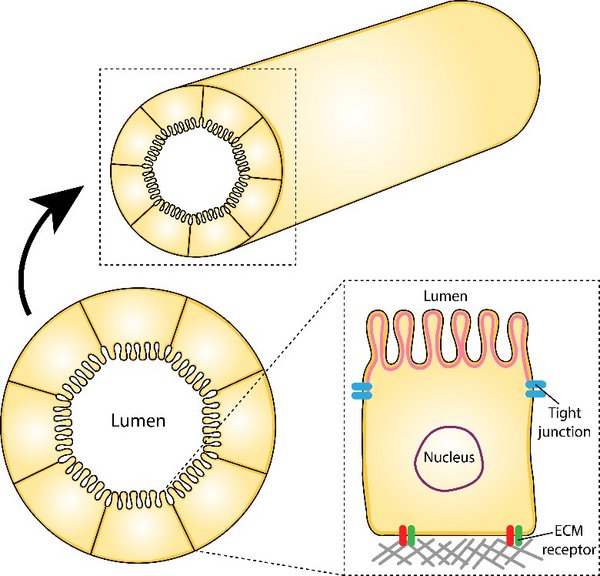Description
Chronic kidney disease is a major, worldwide public health problem with an increasing incidence. In the Netherlands one in ten people has chronic kidney damage. After the kidneys only function for 15%, the patient is in renal failure and is in need of treatment. At present, dialysis and transplantation are the only treatment options. To provide an alternative treatment, regenerative medicine can be used to create the functional subunit of the kidney, namely the nephron.
The goal of this PhD project is to develop a fundamental part of the nephron: the tubular compartment. The tubular compartment serves as a drainage system by transporting filtrate and later urine from the nephrons to the ureter. In vivo the tubules are formed during development by epithelial cells that self-organize into cylindrical structures. This self-organization process is termed tubulogenesis and exists of consecutive morphogenetic processes exerted by epithelial cells that are tightly coordinated in collaboration with neighboring cells across space and time.

Our aim is to design a mechanical microenvironment from which we are able to guide mature renal epithelial cells to achieve in vitro tubulogenesis. First insight in the influence of mechanical stimuli on the morphogenetic processes involved in the formation of renal tubules has to be gained. To this end, an experimental set-up is designed to systematically alter different mechanical parameters. An in silico model will then further help us to understand and predict the effects of these mechanical stimuli on a multi-scale level.
Researchers
Researcher: M.J. (Marjan) Hagelaars
Supervisors: S. (Sandra) Loerakker and C.V.C. (Carlijn) Bouten
Funded by RegMed XB Kidney Moonshot
Contact
-
bacc. Josephine Bulut MscHidde SitalBakkerbaan2264TS Zwaagdijk-Oost
-
drs Inaya WillemsRosalie Martens MAIsmaillaan3132CS Sint Jansteen
-
Guus de Witir. Hanna Ramosvan der Veenpad2803ZN Afferden